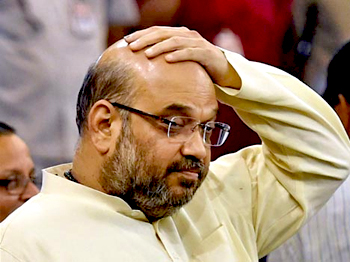New Delhi, Sep 25: Smaller outfits on Wednesday put the Shiv Sena-BJP alliance on tenterhooks by rejecting the meagre seats allotted to them in the seat sharing arrangement for the Maharashtra Assembly elections.
 Swabhimani Paksha, Shiv Sangram and Rashtriya Samaj Paksha, the minor outfits of the grand alliance, threatened to walk out if they were not given “an honourable deal” forcing the principal parties back to the negotiation table, just three days before the closure of filing of nominations for the October 15 polls.
Swabhimani Paksha, Shiv Sangram and Rashtriya Samaj Paksha, the minor outfits of the grand alliance, threatened to walk out if they were not given “an honourable deal” forcing the principal parties back to the negotiation table, just three days before the closure of filing of nominations for the October 15 polls.
BJP president Amit Shah is expected to be in Mumbai on Thursday, when a decision is expected. On Tuesday, the Sena and the BJP had agreed on a seat sharing formula of 151 and 130 seats respectively, leaving seven seats for the minor outfits, which triggered a revolt.
The fourth outfit RPI (A) has declared that it had no problems with the formula.The seat-sharing talks of the ruling Congress-NCP combine also remained deadlocked after the NCP demanded rotation of the chief minister’s post among the allies.
The Congress was not ready to make the concession and maintained distance from the NCP throughout the day.
“We kept waiting for the invitation for talks but none came. We are ready to contest all the seats if our alliance falls apart,” NCP spokesman Nawab Malik said.
AICC spokesman Anand Sharma said the Congress and the NCP were engaged in discussions over the seat sharing. “We are talking together and hopefully will remain together,” he said, adding that the priority was to defeat the communal forces.
A section of the Congress is not in favour on the continuance of the alliance with NCP contending that time was ripe to snap ties and rebuild the party in the state. “If impossible conditions are put, things become difficult,” Chief Minister Prithviraj Chavan said in Karad, from where he is keen on contesting.
Minor partners of the saffron alliance asked the Shiv Sena-BJP to take a final decision on the seat sharing by Wednesday night, failing which their candidates would go ahead with the filing of nomination papers.
Swabhimani Paksha chief Raju Shetti suggested a new formula of 150 seats for the Shiv Sena, 120 for BJP and 18 for the four smaller parties. Shetti held separate consultations with the Shiv Sena and BJP leaders.
By Wednesday evening, a new formula of 150 seats for Shiv Sena, 125 for BJP and 13 for minor allies was being discussed.





Comments
Add new comment